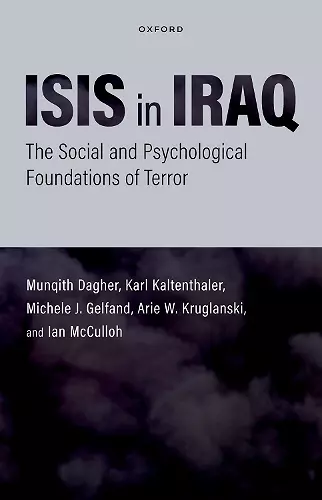ISIS in Iraq
The Social and Psychological Foundations of Terror
Karl Kaltenthaler author Michele J Gelfand author Munqith Dagher author Arie Kruglanksi author Ian McCulloh author
Format:Hardback
Publisher:Oxford University Press Inc
Published:6th Jul '23
Should be back in stock very soon

The Islamic State in Iraq and Syria (ISIS) gained control over large swathes of Iraq in the summer of 2014 at a breathtaking rate. At the time many rightly wondered how ISIS was able to claim so much territory in the Sunni-dominated portion of Iraq so quickly. Just as unexpected, however, was the downfall of ISIS; by 2017, their hold on the region had crumbed with ISIS focusing on avoiding complete annihilation. This book explores the social and psychological factors behind how ISIS was able to rise in Iraq, control most of it, and why most of that population eventually turned on it. Synthesized by some of the foremost experts on terrorism, the analysis is based on a unique array of public opinion data from surveys, focus groups, and interviews. The authors explain why some Iraqis acquiesced to ISIS while others opposed it, why ISIS lost the hearts and minds of Iraqi Sunni Arabs, and ultimately how this contributed to its battlefield defeats. The in-depth face-to-face interviews with ISIS members are a particularly rich source of data, supplementing empirical findings to draw lessons as to what individual and societal-level factors contribute to radicalization and what can be done to counter radicalization and support deradicalization.
I was most impressed by the years of rolling surveys, structured by cutting-edge social science theory and insight, to support the bookâs central argument on the sense of personal and collective significance that ISIS initially afforded Sunni Arabs in the aftermath of America's intervention in Iraq and then squandered through brutal intolerance. The focus on Iraq as the cradle of this violent and dynamic transnational movement, and on local folk in search of meaning and certainty in their lives as opposed to more current journalistic preoccupation with foreign volunteers and the role of ideology, is key to making this book the best empirical work that I have seen on the rise and demise of ISIS. * Scott Atran, Emeritus research director, CNRS-France; co-founder Arris International and Centre for the Resolution of Intractable Conflict, University of Oxford *
ISIS in Iraq provides a unique and insightful analysis of the critical relationship between ISIS and the Iraqi public-what Mao famously termed 'the fish in the sea.' Using a rich and diverse array of data gleaned from surveys, focus groups, and interviews with former ISIS fighters, the authors incisively explain the dynamics of ISIS's ascent to power, its governance of the population and territory of significant parts of two existing countries, and the group's ultimate defeat. * Bruce Hoffman, Georgetown University and author of Inside Terrorism *
The authors provide a unique perspective on the rise and fall of ISIS: that of the Iraqis who watched, participated, or simply survived the experience. The exceptional research presented in this book will help readers better understand the dynamics of ISIS' relative and temporary success, and what the future might bring for the people of Iong-suffering Iraq. * Craig Whiteside, Naval War College, Co-author of The ISIS Reader *
I was most impressed by the years of rolling surveys, structured by cutting-edge social science theory and insight, to support the book's central argument on the sense of personal and collective significance that ISIS initially afforded Sunni Arabs in the aftermath of America's intervention in Iraq and then squandered through brutal intolerance. The focus on Iraq as the cradle of this violent and dynamic transnational movement, and on local folk in search of meaning and certainty in their lives as opposed to more current journalistic preoccupation with foreign volunteers and the role of ideology, is key to making this book the best empirical work that I have seen on the rise and demise of ISIS. * Scott Atran, Emeritus research director, CNRS-France; co-founder Arris International and Centre for the Resolution of Intractable Conflict, University of Oxford *
Leading scholars on the study of terrorism: Arie Kruglanski, Karl Kaltenthaler, Munqith Dagher, Ian McCulloh and Michele Gelfand explore the psychosocial factors prompting the support and eventual opposition toward ISIS in Iraq. The book offers insights into how groups used violence to achieve their political goals basing their analyses on public opinion data, focus groups, and in-depth interviews with front line soldiers and senior personnel. This comprehensive study integrates research from sociology, psychology, political science, and terrorism studies to explain ISIS's genesis, rise, and demise. * Mia Bloom, Georgia State University *
ISBN: 9780197524756
Dimensions: 162mm x 237mm x 22mm
Weight: 490g
272 pages